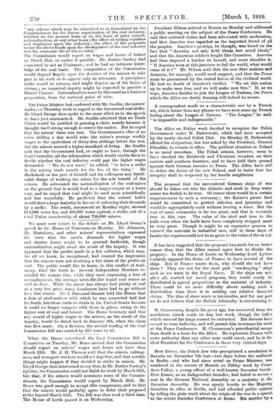The Prime Minister had conferred with Mr. Snuffle, the miners'
leader, on Thursday week in regard to the threatened coal strike. Mr. Lloyd George then spoke to the same effect as in the speech we have just summarized. Mr. Snuffle admitted that no Trade Union would he justified in pressing a claim merely because it thought itself strong enough to coerce the nation. But he urged that the miners' claim was just. The Government's offer elan extra shilling a day would raise the miner's average weekly wages to the equivalent of thirty-five shillings before the war, but the miners wanted a higher standard of living. Mr. Smillie said that the Government had, or ought to have, through the Coal Controller, all the information which would enable them to deride whether the coal industry could pay the higher wages demanded. "We do not want," he added, "to have a strike in the mining trade merely for the fun of the thing." He disclaimed on the part of himself and his colleagues any Syndi- calist design of working the mines for the sole benefit of the miners. He advocated the nationalization of the coal-mines on the ground that it would lead to a larger output at a lower coat, and he urged that coal might be used more scientifically and less wastefully. He predicted that the miners' ballot would show a large majority in favour of enforcing their demands by a strike. The result, announced on Monday night, showed 611,998 votes for, and 104,997 votes against, a strike, out of a total Union membership of about 750,000 miners.


































 Previous page
Previous page